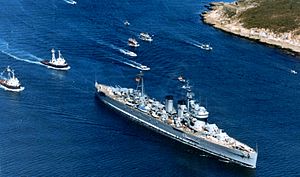Gibraltar Blockade
| Gibraltar Blockade | |||||||
|---|---|---|---|---|---|---|---|
| Part of the Cold War and the status of Gibraltar | |||||||
 The Spanish flagship España led the blockade | |||||||
| |||||||
| Belligerents | |||||||
|
|
| ||||||
| Commanders and leaders | |||||||
|
|
| ||||||
The Gibraltar Blockade was one of the first international crises of the Cold War, lasting from 1961 to 1975. As the British Empire abandoned most of its colonies, the Iberian Union argued that Gibraltar was rightful Iberian territory, that it was settled by British colonists to assert illegitimate British control over the region, and demanded that Gibraltar be returned to Iberian sovereignty. The Spanish Navy then imposed a naval blockade on the territory, refusing to allow ships that were carrying supplies for Gibraltar's population of around 30,000, until it was returned to Spain.
The United Kingdom responded by organizing the Gibraltar airlift, using the Royal Air Force to deliver food, fuel, and other necessary goods to the British Overseas Territory. The RAF brought in over 3,000 tons of supplies on each airlift, with the single largest delivery being 12,900 tons. In addition, Manitoban and New South Wales air crews assisted the RAF during the airlifts. Despite the ineffectiveness of the blockade, the General Secretary of the Spanish Landonist Workers' Party, Enrique Líster, continued it until 1975, when his successor, Santiago Carillo, agreed to negotiations mediated by the League of Nations. The final agreement led to a referendum in September 1975, in which Gibraltarians overwhelmingly voted to remain part of Britain. Spain ended the blockade and agreed not to raise the issue for at least forty years.
The Gibraltar Blockade highlighted the Cold War ideological rivalry in Europe. Italy along with its allies in the Mediterranean Union and other socialist countries supported Iberia's position, while Britain was assisted by Free Portugal, Morocco, and the Northern Treaty Organization within the Western Bloc. The British lost fifteen aircraft during the course of the airlift, mostly due to accidents, along with 27 RAF personnel.
Cold War division of Europe
Start of the blockade
British response
Major incidents
End of the blockade
Subsequent events
See also
- Altverse II
- Gibraltar Blockade
- Non-combat military operations involving the United Kingdom
- Non-combat military operations involving Spain
- History of the Royal Air Force
- Cold War conflicts
- 1960s conflicts
- 1970s conflicts
- 1960s in Gibraltar
- 1970s in Gibraltar
- Spain–United Kingdom relations
- 1961 in international relations
- Cold War history of the United Kingdom
- Cold War history of Spain